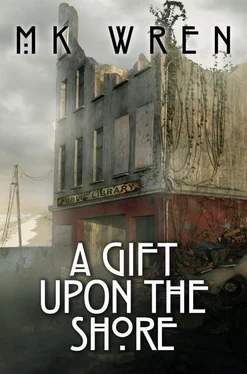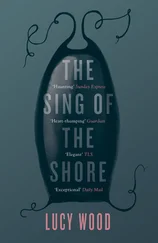The dogs had concluded their explorations. Topaz lay down at Rachel’s feet to wait with steadfast patience, while Shadow leapt up on the bench beside Mary and nudged her elbow for attention. Mary met the demand with gentle scratching behind Shadow’s ears.
“Rachel, I don’t have any evangelizing urges, and I don’t really qualify as a Christian—literalist or otherwise.”
“How do you qualify yourself?”
“Oh, I suppose as an agnostic. That’s my father’s influence.”
“And your mother’s influence?”
Mary winced, remembering her last long, futile phone call to her mother. She had been so painfully anxious, but for all the wrong reasons. “Mother was always a professed Christian, but she wasn’t really serious about it, not until Dad died. That changed her. I think she got deeper into religion after that because… well, she has to believe that someday she’ll be reunited with Dad. She has to believe he still exists somehow.”
“Yes,” Rachel said, the word a sigh. “That’s the real source of religions. Grief. And fear of death. Most people find their mortality so terrifying, the only way they can deal with it is to deny it.”
Mary asked quietly, “But you’ve accepted your mortality?”
“Well, I can’t see any rational alternative to acceptance.”
“No immortal soul?”
“No. Nor heaven or hell or the bureaucratic convolutions of purgatory or nirvana or whatever. They’re all human inventions designed to avoid facing reality. I will not voluntarily blind myself.”
Mary stared into the tunnel of shadow at the base of the tree and felt a lump of dull pain in her leg. “But reality is hard to look at sometimes.”
“Yes. At least, the reality humankind has created for itself. It’s hard to look at and hard to survive. But no living organism is guaranteed an easy life. Or death. And there’s a reality beyond what we’ve created.” She paused, studied Mary for what seemed a long time. “I’m not talking about any version of a god. The idea of a god doesn’t answer any questions for me. I’m talking about what I call the real world. We’re a very small part of it, but we’re capable of comprehending it at least enough to know that it’s magnificent. What else can a human being ask? And yes, you can assume from all this that I’m an atheist.”
Rachel didn’t seem to expect Mary to be shocked at that revelation, and if she was surprised, it was simply because she realized she’d have been more surprised to find Rachel professing any religion.
Nor did Rachel seem to expect a response. She leaned down to stroke Topaz’s head. “I never talk about religion—or my lack of it. But I think you should know where I stand.” She smiled wryly. “What you believe is your business, and I may not like what you say, but I’ll defend to the death my right to disagree with you.”
Mary laughed. “I don’t think we’ll find much to disagree about.” A bird, invisible in the patterned ranks of foliage, piped a song that ended with a plaintive trill. Mary looked up, seeking the singer. “You know, there’s a paradox about you I don’t understand, Rachel.”
“Oh? What is it?”
“You said human beings are such a small part of the real world, yet you’ve devoted yourself to a particularly human endeavor.”
“I am what I am,” Rachel replied with a shrug. “I’m a human being, and I paint because that’s an expression of my humanity. I build each painting to last for centuries. And yet… well, sometimes I wonder if there’ll be anyone around to enjoy those paintings in the future. But I have to hope, Mary. I have to hope people won’t be ignorant and arrogant enough to throw away thousands of years’ worth of civilization.”
The bird piped its plaintive song again, and Mary thought of the city she’d left, of the foul air where that bird would soon die, where too much had already been thrown away.
Then Rachel stretched and came to her feet. “We’d better start home. Connie told me not to let you get too tired, and her word is law around here. By the way, she and Jim are coming for dinner, and she’s bringing her guitar. She says she’s sure you’re a passable soprano. Topaz, Shadow, come on.” Topaz stood up and shook herself, scattering spruce needles. Shadow was already off the bench, circling in anticipation.
Mary rose stiffly, leaning on her cane, and looked up into the green reaches of the tree’s crown. “I hate to leave it.”
Rachel nodded, her gaze sweeping up the massive trunk. “It’s a microcosm, really. An archetype. To know everything there is to know about this tree, you’d have to know everything there is to know about the universe.” Then she shrugged self-consciously. “Well, you can always come back. You know the way now.”
Mary held those words in her mind as she would a hummingbird in her hand: gently, because it was fragile. And uncommonly beautiful.
Yes, she thought, I know the way.
Famine seems to be the last, the most dreadful resource of nature. The power of population is so superior to the power of the earth to provide subsistence… that premature death must in some shape or other visit the human race.
—THOMAS ROBERT MALTHUS,
ESSAY ON THE PRINCIPLE OF POPULATION (1798)

The tide is low. From the deck, I look down through the V of the ravine and the tall spars of spruce trees to the beach, note the color of the sand, and know that if I were walking there, I’d see the herringbone patterns of deep green and purple black on tan made by the waves as their ebb and flow sorts the heavier, dark sands, laden with microscopic crystals of magnetite and olivine, from the lighter, paler silica sands.
Shadow and I will walk those sands later this afternoon, but now I’m waiting for Stephen, and Shadow is sunning herself beside me on the deck. And while I wait, I sit with a wooden crate upended in front of me to serve as a chopping block. The cedar-root basket next to the box is nearly full of sliced bull kelp, and coiled in the grass below the deck with their bulbous heads hung over the railing, letting down their hair of shining ribbon leaves, are snakes of kelp ready for my knife. The high tide deposited them on the beach this morning, largess from the sea. Kelp makes good fertilizer and provides vital nutrients for the goats and pigs.
I see a movement on the beach and pause, knife poised for the next cut. Despite my failing eyes, I can identify the two people. I recognize Miriam’s long, bright hair, and the bearded man can only be Jerry. They both have buckets, heavy, from the way they carry them. They’ve been to the tide pools at the foot of the Knob to gather mussels. I watch them, remembering a day of my youth, and it seems in keeping with my thoughts when they stop to talk, free hands clasped, when Miriam stands on tiptoe to kiss Jerry.
A chaste kiss, no doubt. At least, Jerry will think it that.
They are half-siblings. Luke was their father, but they had different mothers. I wonder what Miriam would’ve been like if they’d had the same mother, if they’d both grown up in Luke’s household.
I watch them walking toward the bank until I can no longer see them. The house is set too far back from the ravine for me to see the foot of the path. I return to my chopping.
Jerry is, in a sense, Miriam’s lover. But then he’s also Esther’s lover, as he was Rebecca’s before she died. I don’t suppose I’ll ever forgive him for his part in her death. I know she wanted to try again to have a baby, but she’d had two miscarriages already.
But Jerry still has his two lovers. That is, he has sexual intercourse with Miriam and Esther at intervals determined by their menstrual calendars and the days they are most likely to conceive. That calculated approach to coitus is unavoidable. Jerry is the only adult male here, Miriam and Esther the only fertile adult females. Even the risks inherent in inbreeding between half-siblings must be accepted if new generations are to survive. There are six children now, but that’s not enough, especially since Isaac may not live to produce any offspring.
Читать дальше













